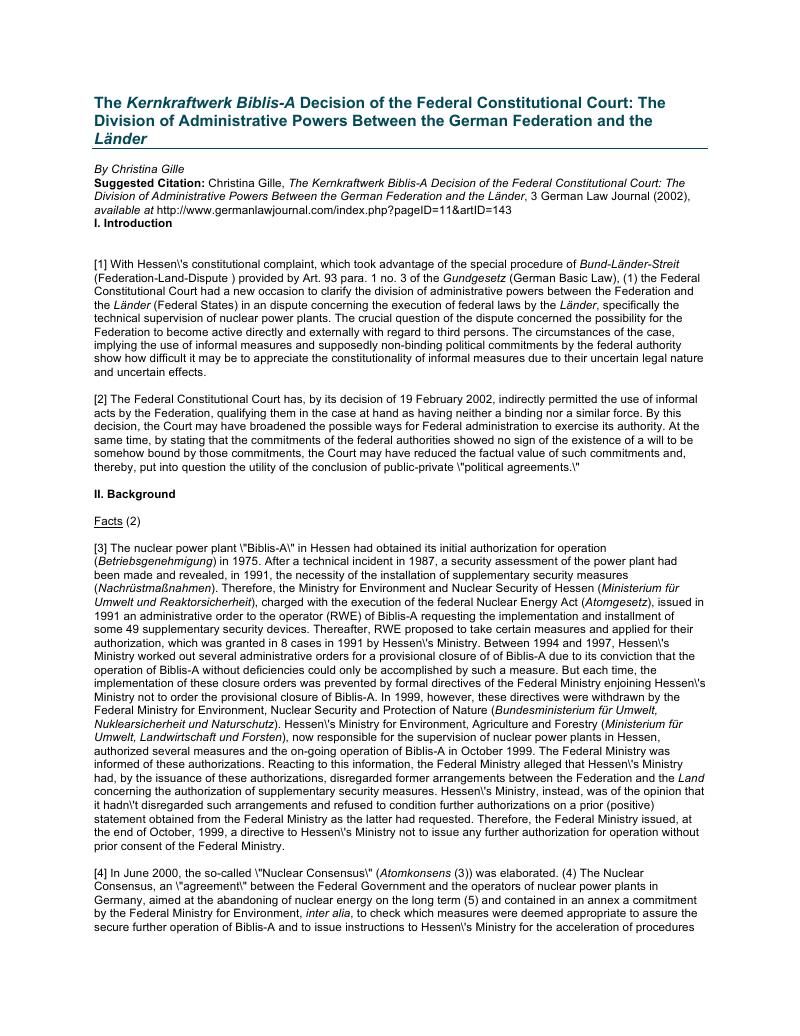No CrossRef data available.
Published online by Cambridge University Press: 06 March 2019

(1) An english version of the German Basic Law is available at http://www.bundesregierung.de.Google Scholar
(2) See the \“Biblis A\“-decision, paras. 2 to 45.Google Scholar
(3) A german version of the Atomkonsens is reprinted in NVwZ-Beilage (supplement) no. IV/2000.Google Scholar
(4) The agreement has only been signed definitely on June 11, 2001.Google Scholar
(5) The way to achieve the progressive abandonment of nuclear energy had not been clear. Consensus existed only concerning the power of the federal legislator to decide not to issue new authorizations for the construction and operation of nuclear power plants (see BVerfGE 49, 89, at 127), but different opinions existed on the conditions required to lawfully end the operation of already existing and authorized nuclear power plants. Critical points concerned, especially, the constitutional right to property (Art. 14 Basic Law) of the operators of the power plants. Therefore, the attempt was made by the conclusion of the \“Nuclear Consensus\” to reach an agreement with the concerned operators of nuclear power plants by the way of which the operators consent to the progressive abandoning of the use of nuclear energy receiving in return commitments from the federal government that the existing nuclear power plants may continue to be operated for a certain time (fixed separately for every single power plant in an annex to the agreement) to ensure the operators that, in the end, their investments in the power plants are going to be paid back. See M. Böhm, Ausstieg im Konsens, 23 NATUR UND RECHT 61 (2001), (discussing two reports by legal scholars on the legal questions raised by the abandoning of nuclear energy). For an in depth discussion of the subject see U. Di Fabio, DER AUSSTIEG AUS DER WIRTSCHAFTLICHEN NUTZUNG DER KERNENERGIE (1999).Google Scholar
(6) A similar phenomenon is evidenced by the most recent \“embryo\” of a constitutional dispute: the discussions concerning the voting in the Bundesrat (the representation of the Länder) on the adoption of the new Immigration Act on March 22, 2002. Each Land is represented in the Bundesrat by several members but the votes of one Land must be given unanimously. In brief, the SPD/Grüne coalitions on the federal and the Länder level were in favour of the new law, the CDU/FDP coalitions were not. Unfortunately, one of Lands – Brandenburg – actually is governed by a SPD/CDU coalition that couldn\'t reach a common position on the issue which lead to the rare situation that one Land had differing voices in its vote in the Bundesrat. The President of the Bundesrat finally only took into consideration the (positive) vote of the Minister President of Brandenburg (SPD), which cast the crucial vote to make the bill pass the Bundesrat. The Länder governed by CDU/FDP coalitions now claim a violation of the voting procedure in the Bundesrat (the majority opinion of constitutional lawyers being that a ununiform vote given by one Land in the Bundesrat has to be qualified as an invalid vote, see FAZ.news at http://de.news.yahoo.com/020322/249/2p3ki.html). The next question is now, whether the Federal President, Johannes Rau (SPD), is going to sign and enacts the law or whether he will cede to the pressure exerced on him by CDU/FDP an declare the law to be the outcome of a procedure that was not conform to the constitutional requirements. See:Google Scholar
http://www.faz.net/IN/INtemplates/faznet/default.asp?tpl=uptoday/content.asp&doc={4ACD-0-D-2-D-26A8-4877-A9FB-277E8F57BB59}&rub={9E7BDE69-469E-11D4-AE7B-0008C7F31E1E}.Google Scholar
(7) A crucial point in the SPD/Grüne coalition agreement of 1998 has been the progressive abandonment of nuclear energy.Google Scholar
(8) Peaceful Use of Nuclear Energy and Protection against its Dangers Act (Gesetz über die friedliche Verwendung der Kernernergie und den Schutz gegen ihre Gefahren), original version in BGBl. I 1976, 3053; actual version in BGBl. I 2001, 2331 (as amended).Google Scholar
(9) Art. 87c GBL together with § 24 para. 1.1 Nuclear Energy Act.Google Scholar
(10) § 7 together with § 23 para. 2 Nuclear Energy Act.Google Scholar
(11) §§ 7, 19 and 23 para. 2 Nuclear Energy Act.Google Scholar
(12) See decision of the Federal Constitutional Court of May 22, 1990 on \“Kalkar II\”, 2 BvG 1/88 (BVerfGE 81, 310), as well dealing with the question of the division of administrative powers between the Federation and the Länder under the regime of execution on federal commission. Confirmed by the decision of the Federal Constitutional Court of April 10, 1991 on \“Schacht Conrad\” (BVerfGE 84, 25). See as well the \“Biblis-A\” decision, para. 71.Google Scholar
(13) See the \“Biblis-A\” decision, paras. 48 to 60.Google Scholar
(14) See footnote 12.Google Scholar
(15) See footnote 12.Google Scholar
(16) See the \“Biblis-A\” decision, para. 72.Google Scholar
(17) See the \“Biblis-A\” decision, para. 74.Google Scholar
(18) See the \“Biblis-A\” decision, para. 83.Google Scholar
(19) See the \“Biblis-A\” decision, para. 75.Google Scholar
(20) See the \“Biblis-A\” decision, para. 75.Google Scholar
(21) See the \“Biblis-A\” decision, paras. 80 and 88.Google Scholar
(22) See footnote 12, at 317.Google Scholar
(23) See the \“Biblis-A\” decision, para. 91.Google Scholar
(24) See dissenting opinion in the \“Biblis-A\” decision, para. 99, with reference to earlier jurisprudence of the Federal Constitutional Court in BVerfGE 63, 1 (39).Google Scholar
(25) See dissenting opinion in the \“Biblis-A\” decision, paras. 102 to 111.Google Scholar
(26) See dissenting opinion in the \“Biblis- A\” decision, para. 117 et seq.Google Scholar
(27) See dissenting opinion in the \“Biblis-A\” decision, paras. 123 to 125.Google Scholar
(28) See dissenting opinion in the \“Biblis-A\” decision, para. 124.Google Scholar
(29) See the \“Biblis-A\” decision, para. 93.Google Scholar
(30) See dissenting opinion in the \“Biblis-A\” decision, para. 117 et seq.Google Scholar
(31) For a discussion of the legal nature of the \“Nuclear Consens\” see H. Wagner, Atomkompromiss und Ausstiegsgesetz, 20 NEUE ZEITSCHRIFT FÜR VERWALTUNGSRECHT 1089, 1091 (2001), who concludes that the \“Nuclear Consensus\” is the sign of a loss of legal culture in reason of its trade-off-character and underlines the competence of the Länder to amend authorizations for the operation of nuclear power plants and to supervise their operation.Google Scholar